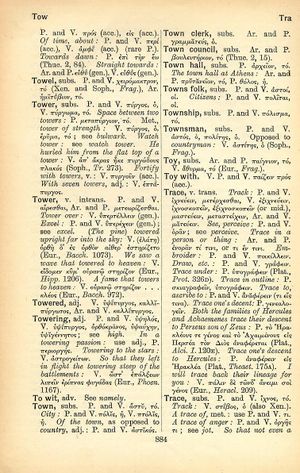towering: Difference between revisions
From LSJ
καλῶς γέ μου τὸν υἱὸν ὦ Στιλβωνίδη εὑρὼν ἀπιόντ' ἀπὸ γυμνασίου λελουμένον οὐκ ἔκυσας, οὐ προσεῖπας, οὐ προσηγάγου, οὐκ ὠρχιπέδισας, ὢν ἐμοὶ πατρικὸς φίλος → Ah! Is this well done, Stilbonides? You met my son coming from the bath after the gymnasium and you neither spoke to him, nor kissed him, nor took him with you, nor ever once felt his balls. Would anyone call you an old friend of mine?
(Woodhouse 5) |
(CSV5) |
||
| Line 1: | Line 1: | ||
{{ | {{Woodhouse1 | ||
| | |Text=[[File:woodhouse_884.jpg|thumb|link={{filepath:woodhouse_884.jpg}}]]'''adj.''' | ||
P. and V. [[ὑψηλός]], V. [[ὑψίπυργος]], [[ὀρθόκρανος]], [[ὑψαύχην]], [[ὑψιγέννητος]]; see [[high]]. | |||
<b class="b2">In a towering passion</b>: use adj., P. [[περιοργής]]. | |||
<b class="b2">Towering to the stars</b>: V. [[ἀστρογείτων]]. | |||
<b class="b2">So that they left in flight the towering steep of the battlements</b>: V. ὥστʼ ἐπάλξεων λιπεῖν ἐρίπνας φυγάδας (Eur., ''Phoen.'' 1167). | |||
}} | }} | ||
Revision as of 10:06, 21 July 2017
English > Greek (Woodhouse)
adj.
P. and V. ὑψηλός, V. ὑψίπυργος, ὀρθόκρανος, ὑψαύχην, ὑψιγέννητος; see high.
In a towering passion: use adj., P. περιοργής.
Towering to the stars: V. ἀστρογείτων.
So that they left in flight the towering steep of the battlements: V. ὥστʼ ἐπάλξεων λιπεῖν ἐρίπνας φυγάδας (Eur., Phoen. 1167).

